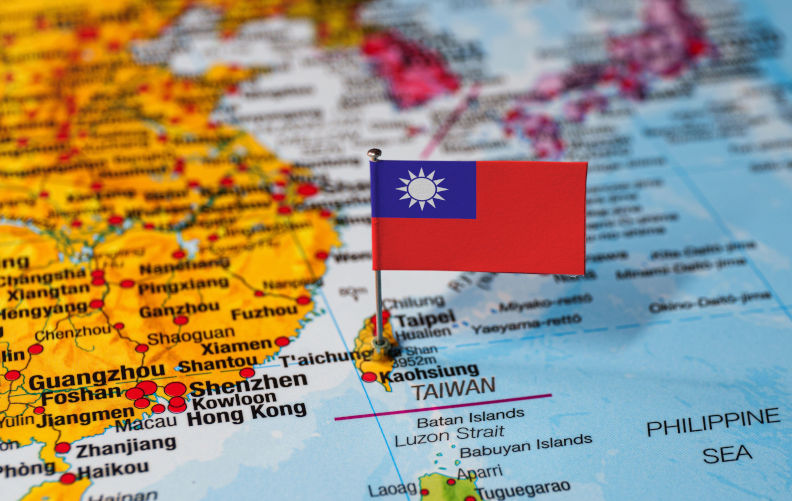Which countries will pick sides in a US-China conflict over Taiwan?
July 26, 2025
Not only would few countries wish to get involved in such a conflict, it’s not clear that the US itself has an appetite for it.
There has been much speculation as to which third parties might get involved if war broke out between China and the United States in the Taiwan Strait. In June, The Economist published an article on this very question. More recently, the Financial Times reported that the US had been putting pressure on Japan and Australia to clarify what role they would play in such a situation.
It appears that there would be few countries on China’s side. China’s only treaty ally is North Korea. A 1961 treaty obliges the two sides to take “all necessary measures” to oppose any country or coalition of countries that attack either nation unprovoked. Although North Korea sending soldiers to fight for Russia in Ukraine could raise the same prospect one day, and Beijing certainly matters much more than Moscow to the survival of a country under extensive international sanctions, currently China’s ties with North Korea appear less warm than those between Russia and North Korea.
Pakistan has been described as an “iron brother” of China. Given its almost unsalvageable relationship with India, Pakistan might seriously consider following through if China asked it to help take on India in a worst-case scenario. However, Islamabad joining a war to assist China against the US – which is a major provider of aid to Pakistan – is highly unlikely.
China’s most useful strategic partner is unquestionably Russia. Their closeness is reflected in their regular air and sea exercises. But why would Russia choose to get involved in a conflict in the Taiwan Strait if China has not provided Russia with military assistance in the Ukraine war? Presumably Russia would continue to sell China oil and gas, just like China is still selling Russia non-military items, but that’s probably all.
On the American side, not more than a handful of countries would provide military assistance to the US in a conflict with China, and each would do so half-heartedly at best. The Economist article seems to share this view as it quotes a recent paper from the Centre for a New American Security (CNAS), though the paper’s analysis is not entirely convincing.
Its first conclusion is obvious: if the US stays out of the war, its allies will, too. The second is that if the US does step in, its most affected allies would be Japan and the Philippines. Japan’s participation would be unlikely to go much further than submarine patrols or missile strikes. The Philippines would be more cautious, the CNAS paper said, but if Chinese forces were bogged down, it might be tempted to advance its claims in the South China Sea.
I agree that Japan and the Philippines would be the countries most affected in that they are both on the first chain of islands close to the Chinese coast. However, I doubt Japan would go beyond providing the US with logistical support for missile attacks on China unless it is attacked by China first.
Meanwhile, it is absurd to suggest the Philippines would be tempted to grab territory in the South China Sea. If that is the case, why wouldn’t Vietnam and Malaysia – which have stronger militaries than the Philippines – do likewise? In the event of China and the US going to war, the challenge for all Southeast Asian countries would be avoiding a conflict that engulfs the entire region. If the conflict spills over into an all-out war, the disputed islands in the South China Sea might not even exist any more.
The CNAS paper is right to say a second group of close US allies and partners – South Korea, Australia and India – would be more insulated, though Washington would likely pressure them to help. South Korea’s primary concern is the Korean peninsula.
The best support Australia could provide the US would be to allow the use of Australian bases to launch attacks on Chinese ships and aircraft. Australian officials worrying that the AUKUS submarine deal could be in jeopardy if Australia stays out of any conflict is understandable, but isn’t avoiding war with the country’s largest trading partner more significant to Canberra than buying a few submarines?
Some in China would argue that India might use a US-China conflict in the Taiwan Strait to claim more territory along the Line of Actual Control, but I doubt that would happen. I agree with the CNAS authors that India would focus on defending its land border with China.
In conclusion, few countries would wish to become involved in a conflict between China and the US. According to Lowy Institute analysis, 199 countries – 62 per cent of UN member states – have endorsed Beijing’s preferred wording, accepting its claim to sovereignty over Taiwan. Of them, 89 per cent support Beijing’s reunification efforts, without specifying that these efforts should be peaceful.
Washington will find it harder than it thinks to pressure its allies to pick sides, especially when its own involvement looks more questionable than ever. Elbridge Colby, a long-time China hawk, wrote in The Wall Street Journal last September that Taiwan “isn’t itself of existential importance to America”.
If the views of Colby, now US undersecretary of defence for policy, could have “softened considerably”, as Senator Roger Wicker said during his confirmation hearing, it gives a clue as to where things are moving. US President Donald Trump rarely misses a chance to express an opinion, but so far he has not said much on the Taiwan issue. Is he keeping quiet while waiting for a chance to make a deal? His silence could not be louder.
Republished from the South China Morning Post, 24 July 2025
The views expressed in this article may or may not reflect those of Pearls and Irritations.

